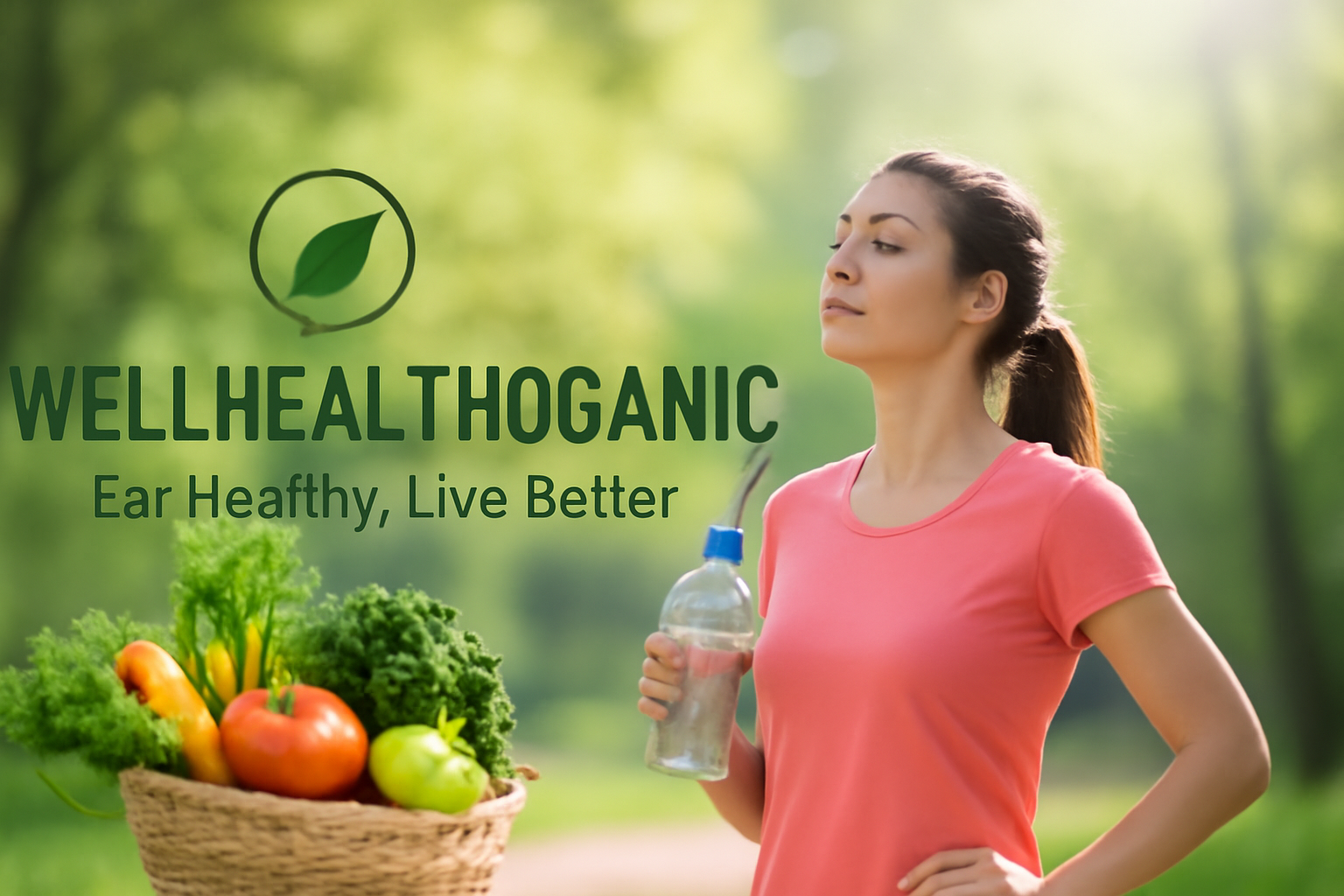Introduction
The concept of “WellHealthOrganic” represents more than just a diet or lifestyle. It symbolizes a commitment to nourishing the body, caring for the environment, and living in harmony with the world around us. A focus on organic foods, sustainable farming, and overall well-being can enhance the health of individuals, communities, and the planet alike. This blog post will explore the significance of a WellHealthOrganic lifestyle, the benefits it offers, and how to make this approach part of your daily life.
The Significance of a WellHealthOrganic Way of Life
The WellHealthOrganic way of life revolves around the idea that personal health and environmental sustainability are intertwined. The rise in interest around organic foods, sustainable agriculture, and ethical practices reflects a growing desire for a holistic approach to health that extends beyond the individual. At its core, this lifestyle emphasizes the importance of natural, whole foods and practices that avoid harmful chemicals or processes. By focusing on what is best for the body, mind, and the earth, the WellHealthOrganic way encourages individuals to make mindful choices that lead to a healthier, more balanced life.
Nurturing Your Body with High-Quality Nutrition
High-quality nutrition forms the foundation of a healthy lifestyle. Organic food, in particular, plays a crucial role in providing the body with the essential vitamins, minerals, and nutrients it needs to thrive. Unlike conventionally grown foods, organic produce is cultivated without the use of synthetic pesticides, fertilizers, or genetically modified organisms (GMOs), making it a healthier choice for consumers. Research indicates that organic foods may have higher levels of certain nutrients, such as antioxidants, vitamins, and minerals, compared to their conventionally grown counterparts. By choosing organic, individuals can nourish their bodies with food that is both more nutritious and free from harmful chemicals, leading to improved overall health and well-being.
Moreover, organic farming practices focus on soil health and biodiversity, contributing to more nutrient-rich produce. Organic foods are often fresher, as they are typically grown in local, smaller-scale farms, ensuring that they reach consumers at their peak nutritional value.
Promoting Sustainable Agriculture
Sustainable agriculture is a key aspect of the WellHealthOrganic lifestyle. This farming approach seeks to preserve and protect the environment while producing food in a way that can be maintained over time. It focuses on practices that reduce environmental harm, such as crop rotation, organic pest control, and the use of renewable resources. In contrast to conventional agriculture, which relies heavily on synthetic chemicals and practices that degrade the environment, sustainable farming aims to minimize pollution and preserve natural ecosystems. This approach not only benefits the land and water but also contributes to a healthier food supply. Supporting sustainable agriculture through the purchase of organic products promotes environmentally responsible farming methods and encourages a shift towards food systems that prioritize long-term ecological health. By choosing organic foods, individuals can actively contribute to the protection of the planet.
Advocating for Animal Rights
Animal welfare is another essential component of the WellHealthOrganic lifestyle. Organic farming standards include guidelines that promote better treatment of animals, ensuring that they are raised in humane conditions. Animals on organic farms are often given more space to roam, access to pasture, and a diet that aligns with their natural needs. By choosing organic products, particularly animal-based products like meat, dairy, and eggs, consumers can support farming practices that prioritize animal welfare. Organic certification for animal products includes strict regulations that prevent the use of antibiotics, growth hormones, and other harmful substances often found in conventional farming. Incorporating animal rights into a WellHealthOrganic lifestyle means making more ethical choices about food consumption. It involves supporting practices that not only provide better lives for animals but also contribute to healthier food options for people.
Enhancing Community Health
A WellHealthOrganic lifestyle can have positive effects on the broader community, not only through personal health but also by fostering a culture of sustainability and well-being. Communities that embrace organic living tend to be more health-conscious and aware of the environmental impact of their actions. By supporting local, organic farmers and businesses, individuals can contribute to their community’s economic growth and well-being. Organic farms often provide local jobs and support regional economies, while community-driven health initiatives focused on organic foods can raise awareness about the importance of nutrition and sustainable practices. Additionally, organic farming reduces the use of harmful chemicals that can pollute water supplies and the air, promoting cleaner, healthier environments for everyone. As more people adopt organic practices, communities benefit from increased access to nutritious foods, improved environmental quality, and a stronger connection to local agriculture.
The Impact of Organic Selections
The shift towards organic selections has a profound impact on both individual health and the global environment. Organic foods, when compared to their conventional counterparts, tend to be free from harmful additives and chemicals that can accumulate in the body over time. By eliminating or reducing exposure to pesticides, herbicides, and synthetic fertilizers, individuals lower their risk of developing health issues such as hormone imbalances, cancer, and allergies. Additionally, the environmental benefits of organic farming cannot be overstated. Organic farming practices promote biodiversity, reduce water pollution, and protect soil health. By choosing organic, consumers not only safeguard their health but also contribute to the preservation of the planet’s resources for future generations.
Organic products, from fruits and vegetables to dairy and meat, offer a more sustainable way to meet the world’s growing food demands while reducing the environmental footprint of agriculture. The impact of these choices is far-reaching, influencing not only our immediate well-being but also the future of the planet.
Incorporating WellHealthOrganic into Everyday Living
Adopting a WellHealthOrganic lifestyle doesn’t require drastic changes overnight. Instead, it is about making small, mindful decisions that support a healthier and more sustainable way of living. Here are a few simple ways to incorporate WellHealthOrganic principles into your daily routine:
1. Choose Organic Foods
Start by replacing conventional products with organic alternatives. Focus on foods that are most commonly exposed to pesticides, such as fruits and vegetables. Organic options for meat, dairy, and grains are also widely available. Make a habit of reading labels to ensure that the products you buy are certified organic.
2. Support Local Farmers
Buying from local organic farmers markets or community-supported agriculture (CSA) programs helps support small-scale, sustainable farming practices. It also reduces the carbon footprint associated with transporting food over long distances.
3. Reduce Waste
Minimize food waste by purchasing only what you need, using leftovers creatively, and composting organic materials. Reducing waste not only helps the environment but also supports a more sustainable food system.
4. Use Eco-Friendly Products
Incorporate eco-friendly household products, such as biodegradable cleaners, recycled materials, and organic cotton fabrics, into your daily routine. These choices reduce the environmental impact of your lifestyle and promote overall well-being.
5. Adopt Mindful Eating Habits
Focus on eating more whole foods, including vegetables, fruits, whole grains, and healthy fats. By prioritizing nutrient-dense foods and reducing processed options, you’ll better support your body’s health and energy levels.
Choosing Organic: A Journey to Wellness
Choosing an organic lifestyle is a personal journey toward better health, but it also involves understanding the broader implications of your decisions. It is about adopting a mindset that values the interconnection between personal health, animal welfare, sustainable agriculture, and community well-being. This journey begins with education—understanding the health benefits of organic foods, the importance of ethical farming practices, and how consumer choices can support a more sustainable future. As more individuals embrace this lifestyle, the demand for organic products continues to grow, signaling a shift toward a more responsible and health-conscious society.
Exercise and Organic Lifestyle
A well-rounded approach to health includes both a nutritious diet and regular physical activity. Exercise is vital for maintaining cardiovascular health, building strength, and improving overall well-being. Pairing regular physical activity with an organic lifestyle can amplify the benefits of both, creating a holistic approach to health that nurtures both the body and the environment.
The Comprehensive Advantages of Consistent Physical Activity
Engaging in consistent physical activity has far-reaching benefits. It improves cardiovascular health, strengthens muscles and bones, enhances flexibility, and supports mental clarity. Exercise also aids in maintaining a healthy weight, reducing the risk of chronic conditions like diabetes, and boosting mood through the release of endorphins. An organic lifestyle, rich in high-quality nutrients, provides the fuel necessary for optimal performance during physical activities. With a focus on whole, nutrient-dense foods, your body is better equipped to recover from workouts and maintain the energy levels needed for an active lifestyle.
Dedication to a Healthier Planet
Ultimately, a WellHealthOrganic lifestyle is about more than individual health. It is about making choices that protect the planet, ensure the well-being of animals, and promote sustainable farming practices for future generations. As more individuals adopt organic lifestyles, they contribute to a global movement toward a healthier, more sustainable world.
Future Prospects
Looking forward, the future of the WellHealthOrganic lifestyle seems promising. As awareness grows about the benefits of organic living, more individuals are likely to embrace sustainable practices, pushing for even greater demand for organic products. Innovations in organic farming, technology, and sustainable practices will continue to shape the future of food production and consumption. Additionally, as the world grapples with issues like climate change, environmental degradation, and resource depletion, organic farming offers a way forward. The continued integration of organic methods into mainstream agriculture could be a crucial step toward a more resilient and sustainable global food system.
Final Thoughts
Living a WellHealthOrganic lifestyle is not just a trend—it’s a commitment to improving personal health, protecting the planet, and supporting ethical practices in agriculture and food production. By choosing organic foods, advocating for sustainable farming, and incorporating healthy habits into daily life, individuals can create a positive impact on their well-being and the world around them. The journey toward wellness is an ongoing process, and adopting a WellHealthOrganic way of life can be a transformative experience that benefits not only the individual but also the broader community and future generations. It is a powerful reminder that our choices today shape the world we live in tomorrow.
FAQS
1. What is the WellHealthOrganic lifestyle?
The WellHealthOrganic lifestyle is a holistic approach to health that emphasizes organic foods, sustainable farming, and ethical practices to promote personal and environmental well-being.
2. Why should I choose organic food?
Organic foods are free from synthetic pesticides and fertilizers, offering more nutrients and better taste. They support sustainable farming practices and contribute to a healthier planet.
3. How can organic living benefit the environment?
Organic farming reduces environmental harm by minimizing pollution, protecting biodiversity, and conserving soil health, leading to a more sustainable food system.
4. What role does animal welfare play in WellHealthOrganic?
Animal welfare is a key aspect, as organic farming ensures animals are treated humanely, with more space to roam and a natural diet, free from growth hormones or antibiotics.
5. How can I incorporate WellHealthOrganic practices into my daily life?
Start by choosing organic foods, supporting local farmers, reducing waste, and adopting eco-friendly products and mindful eating habits to live a healthier and more sustainable life.


